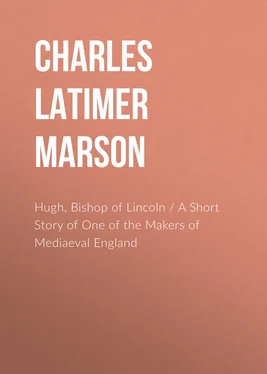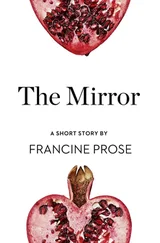Charles Latimer Marson - Hugh, Bishop of Lincoln / A Short Story of One of the Makers of Mediaeval England
Здесь есть возможность читать онлайн «Charles Latimer Marson - Hugh, Bishop of Lincoln / A Short Story of One of the Makers of Mediaeval England» — ознакомительный отрывок электронной книги совершенно бесплатно, а после прочтения отрывка купить полную версию. В некоторых случаях можно слушать аудио, скачать через торрент в формате fb2 и присутствует краткое содержание. Жанр: foreign_prose, foreign_antique, на английском языке. Описание произведения, (предисловие) а так же отзывы посетителей доступны на портале библиотеки ЛибКат.
- Название:Hugh, Bishop of Lincoln / A Short Story of One of the Makers of Mediaeval England
- Автор:
- Жанр:
- Год:неизвестен
- ISBN:нет данных
- Рейтинг книги:3 / 5. Голосов: 1
-
Избранное:Добавить в избранное
- Отзывы:
-
Ваша оценка:
- 60
- 1
- 2
- 3
- 4
- 5
Hugh, Bishop of Lincoln / A Short Story of One of the Makers of Mediaeval England: краткое содержание, описание и аннотация
Предлагаем к чтению аннотацию, описание, краткое содержание или предисловие (зависит от того, что написал сам автор книги «Hugh, Bishop of Lincoln / A Short Story of One of the Makers of Mediaeval England»). Если вы не нашли необходимую информацию о книге — напишите в комментариях, мы постараемся отыскать её.
Hugh, Bishop of Lincoln / A Short Story of One of the Makers of Mediaeval England — читать онлайн ознакомительный отрывок
Ниже представлен текст книги, разбитый по страницам. Система сохранения места последней прочитанной страницы, позволяет с удобством читать онлайн бесплатно книгу «Hugh, Bishop of Lincoln / A Short Story of One of the Makers of Mediaeval England», без необходимости каждый раз заново искать на чём Вы остановились. Поставьте закладку, и сможете в любой момент перейти на страницу, на которой закончили чтение.
Интервал:
Закладка:
The two friends visited each other often, and the troubles of Henry’s last years were softened for him by his ghostly friend. It is quite possible that Hugh’s hand may be traced in the resignation of Geoffrey Plantagenet, the king’s dear illegitimate son, who was (while a mere deacon) bishop-elect of Lincoln from 1173 to 1181. From the age of twenty to twenty-eight he enjoyed the revenues of that great see without consecration. The Pope objected to his birth and his youth. Both obstacles could have been surmounted, but Geoffrey resigns his claims in the Epiphany of the latter year, and gets a chancellorship with five hundred marks in England and the same in Normandy. His case is a bold instance of “that divorce of salary from duty” which even in those times was thoroughly understood.
There is a story, one might almost say the usual story, of the storm at sea. The king with a fleet is between Normandy and England, when a midnight storm of super-Virgilian boisterousness burst upon them. After the manner of Erasmus’ shipwreck, every one prays, groans, and invokes both he and she saints. The king himself audibly says, “Oh, if only my Charterhouse Hugh were awake and instant at his secret prayers, or if even he were engaged with the brethren in the solemn watch of the divine offices, God would not so long forget me.” Then, with a deep groan, he prayed, “God, whom the William Prior serves in truth, by his intervention and merits, take kindly pity upon us, who for our sins are justly set in so sore a strait.” Needless to say the storm ceased at once, and Henry felt that he was indeed upon the right tack, both nautically and spiritually. Whatever view we take of this tale (storms being frequent, and fervent prayers of the righteous availing much), the historic peep into King Henry’s mind is worth our notice. The simplicity and self-abasement of his ejaculation shew a more religious mind than some would allow to him.
Anyhow, the prior was hard at work. He soon transformed the “weeps” into stone. He built the two houses, the friary for the lay brethren and the monastery for the monks. He prayed, read, meditated and preached. His body slept, but his heart woke, and he repeated “Amens” innumerable in his holy dreams. On feast days, when the brethren dined together, he ate with them, and then he had the meal sauced with reading. If he ate alone, he had a book by his trencher of dry bread rarely garnished with relishes. A water pot served him for both flagon and tureen. He allowed himself one little human enjoyment. A small bird called a burnet made friends with him and lived in his cell, ate from his fingers and his trencher, and only left him at the breeding season, after which it brought its fledged family back with it. This little friend lived for three years with the prior, and to his great grief came no more in the fourth. The learned have exhausted their arts to discover what a burnet can be, and have given up the chase. Some would have him to be a barnacle goose, others a dab-chick or coot—none of which can fairly be classed as aviculæ small birds. Burnet is brown or red brown, and rather bright at that. We have it in Chaucer’s “Romaunt of the Rose” [4756]:
“For also welle wole love be sette
Under ragges as rich rochette,
And else as wel be amourettes
In mournyng blak, as bright burnettes.”
Consequently if the reader likes to guess (in default of knowledge) he might do worse than think of the Robin Redbreast as a likely candidate. He is called in Celtic Broindeag, is a small, friendly, crumb-eating, and burnet bird, and behaves much as these ancient legends describe. The name burnet still survives in Somerset.
Not only the burnet bird felt the fascination of the prior, but monks drew towards Witham and men of letters also. Men of the world would come to be taught the vanity of their wisdom; clergy whose dry times afflicted them found a rich meal of Witham doctrine well worth the spare diet of the place. The prior by no means courted his public, and the Order itself was not opened at every knuckle tap. Even those who were admitted did not always find quite what they wanted. We read of one man, a Prior of Bath, who left the Charterhouse because he “thought it better to save many souls than one,” and returned to what we should call parish work. Alexander of Lewes, a regular Canon, well versed in the quadrivium (arithmetic, geometry, music, and astronomy), found the solitude intolerable to his objective wits. He was not convinced of the higher spirituality of co-operative hermitages. He found it too heavy to believe that there was no Christendom outside the Charterhouse plot, and no way of salvation except for a handful of mannikins. Alexander, with stinging and satiric terms, left in a huff, followed by acrimonious epithets from his late brethren. He became a monk at Reading, and filled a larger part upon a more spacious stage, and yet would have most gladly returned; but the strait cell was shut to him relentlessly and for ever. Andrew, erst sacristan of Muchelney, was another who left the Order for his first love, but his dislike of the life was less cogently put. It was not exactly that the prior could not brook opposition: but he hated a man who did not know his own mind, and nothing would induce him to allow an inmate who eddied about.
The Charterhouse now had ecclesiastical independence. The bishop’s power ended outside its pale. Bruton Convent could tithe the land no more, nor feed their swine or cattle there, nor cut fuel, instead of which the rectory of South Petherton, and its four daughter chapelries, was handed over to this bereaved convent. This was in April, 1181. This transaction was some gain to the game-loving king, for the Withamites ate neither pork nor beef, and so the stags had freer space and more fodder.
But nevertheless the monks’ poverty was almost ludicrous. Hugh wanted even a complete and accurate copy of the scriptures, which he used to say were the solitary’s delight and riches in peace, his darts and arms in war, his food in famine and his medicine in sickness. Henry asked why his scribes did not make copies. The answer was that there was no parchment. “How much money do you want?” asked the king. “One silver mark,” was the ungrasping request. Henry laughed and ordered ten marks to be counted out and promised a complete “divine library” besides. The Winchester monks had just completed a lovely copy (still in existence). King Henry heard from a student of this fine work and promptly sent for the prior. With fair words and fine promises he asked for the Bible. The embarrassed monk could not well say no, and the book was soon in Hugh’s hands. This Prior Robert shortly after visited Witham and politely hoped the copy was satisfactory. If not, a better one could be made, for great pains had been taken by St. Swithun’s brethren to make this one agreeably to their own use and custom. Hugh was astonished. “And so the king has beguiled your Church thus of your needful labour? Believe me, my very dear brother, the Library shall be restored to you instantly. And I beg most earnestly through you that your whole fraternity will deign to grant pardon to our humility because we have ignorantly been the occasion of this loss of their codex.” The prior was in a fright, as well he might be, at the shadow of the king’s wrath. He assured Hugh that his monks were all delighted at the incident. “To make their delight continue, we must all keep quiet about the honest restoration of your precious work. If you do not agree to take it back secretly, I shall restore it to him who sent it hither; but if you only carry it off with you, we shall give him no inkling of the matter.” So the Winchester monks got back their Bible, and Witham got the said Prior Robert as one of its pupils instead, fairly captured by the electric personality of the Carthusian.
Читать дальшеИнтервал:
Закладка:
Похожие книги на «Hugh, Bishop of Lincoln / A Short Story of One of the Makers of Mediaeval England»
Представляем Вашему вниманию похожие книги на «Hugh, Bishop of Lincoln / A Short Story of One of the Makers of Mediaeval England» списком для выбора. Мы отобрали схожую по названию и смыслу литературу в надежде предоставить читателям больше вариантов отыскать новые, интересные, ещё непрочитанные произведения.
Обсуждение, отзывы о книге «Hugh, Bishop of Lincoln / A Short Story of One of the Makers of Mediaeval England» и просто собственные мнения читателей. Оставьте ваши комментарии, напишите, что Вы думаете о произведении, его смысле или главных героях. Укажите что конкретно понравилось, а что нет, и почему Вы так считаете.












